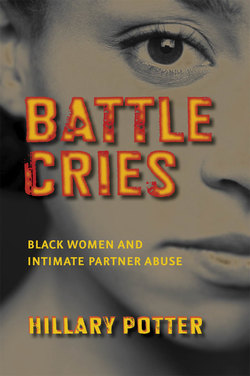Battle Cries

Реклама. ООО «ЛитРес», ИНН: 7719571260.
Оглавление
Hillary Potter. Battle Cries
Battle Cries
Отрывок из книги
Battle Cries
Hillary Potter
.....
The strong mothers often helped the women to resist further intimate partner abuse. As I describe in Chapter 7, the women’s mothers were a substantial resource for leaving abusive relationships. Thirty-nine-year-old Rebecca elaborated on how her mother and othermothers were a source of strength while she dealt with abuse: “There were a very, very large amount of strong women in my family who helped me get through a lot of what I’ve been through.”
I will expand on the relevance of some of the women receiving special treatment in their families of origin in the following chapter, but there are connections between this status in their families and issues of Strong Black Women that should be introduced here. The women who did not describe their mothers or main mother-figures as Strong Black Women included six of the seven women who received special treatment in their families of origin (four of the seven were not exposed to any major forms of violence in childhood). Harriet’s mother died when Harriet was young, leaving her father as her main parent and role model, and the mothers of the other six women would not have been considered to fit the definition of the Strong Black Woman during the women’s childhoods. An additional three women who did not describe their mothers as Strong Black Women (a) did not fit within the special-treatment category; (b) were exposed to at least one form of violence during their upbringing; and (c) were raised by both biological parents. One woman’s parents were regularly under the influence of drugs and were virtually absent as parents. Within the other two sets of parents, the mothers were particularly docile and modeled the more “traditional” role of mother and wife by being fairly reserved and not major decision makers in the homes of origin. However, even most of the women who did not have Strong Black Mother role models began to describe themselves as Strong Black Women toward the end or after the conclusion of their abusive relationships. These self-perceptions were created because of their personal dealings with the many social structure and cultural struggles faced by most Black women in U.S. society and because of their fortitude during the intimate partner abuse. Their views of themselves as strong were often solidified through interactions with White women, who, as highlighted earlier, were regarded as pampered and weak. Fittingly, even women without Strong Black Mothers as role models came to view themselves as strong for having lived through unfortunate circumstances. For instance, Wendy was a “special-treatment” child and did not have a mother who fit in the Strong Black Woman characterization. However, she described how her mother eventually displayed strength qualities after years of abuse by her husband (Wendy’s father). As evident in her appraisal of herself and her mother a couple of years prior to my conversation with her, Wendy followed her mother’s path to the Strong Black Woman characterization: “By this time, I had became my mother: the Strong Black Woman.”
.....